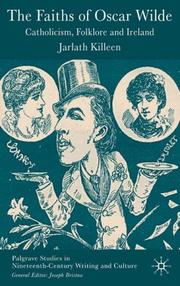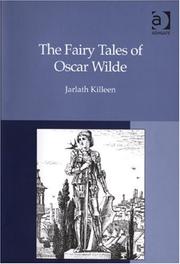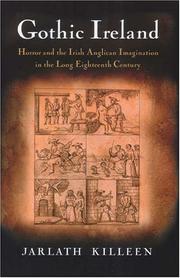| Listing 1 - 10 of 13 | << page >> |
Sort by
|

ISBN: 1403948941 1349525278 9786610425662 1280425660 0230503551 Year: 2005 Publisher: New York : Palgrave Macmillan,
Abstract | Keywords | Export | Availability | Bookmark
 Loading...
Loading...Choose an application
- Reference Manager
- EndNote
- RefWorks (Direct export to RefWorks)
Christianity and literature --- Literature and folklore --- Catholics --- Christianity in literature. --- Christianisme et littérature --- Littérature et folklore --- Catholiques --- Christianisme dans la littérature --- History --- Intellectual life. --- Histoire --- Vie intellectuelle --- Wilde, Oscar, --- Religion. --- Criticism and interpretation. --- Homes and haunts --- Knowledge --- Folklore. --- 820 "18" WILDE, OSCAR --- Engelse literatuur--19e eeuw. Periode 1800-1899--WILDE, OSCAR --- Ireland --- 820 "18" WILDE, OSCAR Engelse literatuur--19e eeuw. Periode 1800-1899--WILDE, OSCAR --- Intellectual life --- Christianisme et littérature --- Littérature et folklore --- Christianisme dans la littérature --- Christianity in literature --- Folklore and literature --- Literature and folk-lore --- Folklore --- Literature and Christianity --- Literature --- Christian literature --- Christians --- Wilde, Oscar --- Ke-ke-neh-che-ke --- Ka-kan-dji-ga --- Melmoth, Sebastian, --- Uaĭlʹd, Oskar, --- C. 3. 3, --- C. Three Three, --- Ṿild, Osḳar, --- Wilde, Oscar Fingall O'Flahertie Wills, --- Ṿaild, Osḳar, --- Vaildas, Oskaras, --- Author of Lady Windermere's fan, --- Lady Windermere's fan, Author of, --- Vailds, Oskars, --- Ouailnt, Oskar, --- Uaylt, Ōskʻar, --- Уайльд, Оскар, --- Уальд, Оскар, --- וויילד, אוסקר, --- וויילד, אסקאר --- וויילד, אסקאר, --- ווילד, אסקאר --- ויילד, אוסקר --- ויילד, אוסקר, --- וילד, אוסקר --- וילד, אוסקר, --- וילד, אסקר, --- װײלד, אסקאר --- װײלד, אסקאר, --- وايلد، أوسكار --- وايلد، اسكار --- オスカー・ワイルド
Book
ISBN: 9780748690817 0748690816 0748697128 9780748697120 132298087X 9781322980874 9780748690800 0748690808 Year: 2013 Publisher: Edinburgh University Press
Abstract | Keywords | Export | Availability | Bookmark
 Loading...
Loading...Choose an application
- Reference Manager
- EndNote
- RefWorks (Direct export to RefWorks)
This study provides a robustly theorised and thoroughly historicised account of the beginnings of Irish gothic fiction, maps the theoretical terrain covered by other critics, and puts forward a new history of the emergence of the genre in Ireland.
Gothic fiction (Literary genre), English --- Monsters in literature. --- English gothic fiction (Literary genre) --- English fiction --- History and criticism. --- Gothic novel. --- Geschichte. --- Irland. --- Literature --- Allegory --- Anglicanism --- Catholic Church --- Gothic architecture --- Ireland --- Protestantism
Book
ISBN: 0708322441 9780708322444 9781783163892 1783163895 9780708320709 0708320708 9780708320693 0708320694 Year: 2009 Publisher: Cardiff
Abstract | Keywords | Export | Availability | Bookmark
 Loading...
Loading...Choose an application
- Reference Manager
- EndNote
- RefWorks (Direct export to RefWorks)
This volume in this exciting new series provides a detailed yet accessible study of Gothic literature in the nineteenth century. It examines how themes and trends associated with the early Gothic novels were diffused widely in many different genres in the Victorian period, including the ghost story, the detective story and the adventure story.
Gothic fiction (Literary genre) --- English fiction --- Children in literature. --- Gothic fiction (Literary genre), English --- English gothic fiction (Literary genre) --- Childhood in literature --- Children in poetry --- Gothic horror tales (Literary genre) --- Gothic novels (Literary genre) --- Gothic romances (Literary genre) --- Gothic tales (Literary genre) --- Romances, Gothic (Literary genre) --- Detective and mystery stories --- Horror tales --- Suspense fiction --- History and criticism.

ISBN: 9780754658139 0754658139 Year: 2007 Publisher: Aldershot : Ashgate,
Abstract | Keywords | Export | Availability | Bookmark
 Loading...
Loading...Choose an application
- Reference Manager
- EndNote
- RefWorks (Direct export to RefWorks)
Children's literature, English --- Fairy tales --- History and criticism. --- Wilde, Oscar, --- Criticism and interpretation.
Book
ISBN: 0716530740 0716530759 9780716530749 9780716530756 Year: 2011 Publisher: Dublin Irish Academic Press
Abstract | Keywords | Export | Availability | Bookmark
 Loading...
Loading...Choose an application
- Reference Manager
- EndNote
- RefWorks (Direct export to RefWorks)

ISBN: 1851829431 Year: 2005 Publisher: Dublin Four courts press
Abstract | Keywords | Export | Availability | Bookmark
 Loading...
Loading...Choose an application
- Reference Manager
- EndNote
- RefWorks (Direct export to RefWorks)
English literature --- Gothic fiction (Literary genre), English --- Horror in literature --- Horror tales, English --- Irish authors --- History and criticism
Book
ISBN: 9783034322232 3034322232 Year: 2016 Publisher: Oxford Peter Lang
Abstract | Keywords | Export | Availability | Bookmark
 Loading...
Loading...Choose an application
- Reference Manager
- EndNote
- RefWorks (Direct export to RefWorks)
Book
ISBN: 1787070522 Year: 2016 Publisher: Oxford, [England] : Peter Lang,
Abstract | Keywords | Export | Availability | Bookmark
 Loading...
Loading...Choose an application
- Reference Manager
- EndNote
- RefWorks (Direct export to RefWorks)
Best known for his Gothic masterpiece Uncle Silas and the vampire story Carmilla, Joseph Sheridan Le Fanu was a prolific writer whose extensive body of work included historical, sensation and horror novels, poems and ballads, numerous stories of the supernatural, journalism and a verse-drama. While his name is well known to aficionados of the horror genre, much of his work still remains in the shadows. Indeed, despite his vampire creation, Carmilla, being the best-known female blood-sucker in the world, and despite an enormous scholarly and popular interest in the novella in which this character first appeared (an interest evident in the very large number of cinematic, televisual and even new media adaptations of the story), Le Fanu himself is almost completely unknown outside of the world of Irish Gothic scholarship, and most of his fiction remains difficult to obtain or is out of print. To celebrate the bicentenary of Le Fanu's birth, this collection brings together established scholars and emerging researchers in order to shed new light on some of his less famous fiction and celebrate his influential contribution to the Gothic genre. The main aim of the collection is to read Le Fanu in the round, expanding the critical focus away from its current obsession with a small proportion of his work and taking account of the full extent of his writing, from his other Gothic novels, The Rose and the Key, Haunted Lives and A Lost Name, to his short stories and journalism. The collection also considers Le Fanu's relationship to Victorian Ireland and especially Dublin from a number of different angles, as well as addressing his status as an 'Irish' writer of substance.
Digital
ISBN: 9780748690817 Year: 2014 Publisher: Edinburgh Edinburgh University Press
Abstract | Keywords | Export | Availability | Bookmark
 Loading...
Loading...Choose an application
- Reference Manager
- EndNote
- RefWorks (Direct export to RefWorks)
Book

ISBN: 9780748654970 0748654976 9780748642496 0748642498 9780748654994 9780748654987 132298025X Year: 2022 Publisher: Edinburgh
Abstract | Keywords | Export | Availability | Bookmark
 Loading...
Loading...Choose an application
- Reference Manager
- EndNote
- RefWorks (Direct export to RefWorks)
These 14 chapters, each written by an acknowledged expert in the field, provide an invaluable insight into the complex and various Gothic forms of the nineteenth century. Covering a range of diverse contexts, the chapters focus on science, medicine, Queer theory, imperialism, nationalism, and gender. Together with further chapters on the ghost story, realism, the fin de siècle, pulp fictions, sensation fiction, and the Victorian way of death, the Companion provides the most complete overview of the Victorian Gothic to date. The book is an essential resource for students and scholars working on the Gothic, Victorian literature and culture, and critical theory.
| Listing 1 - 10 of 13 | << page >> |
Sort by
|

 Search
Search Feedback
Feedback About UniCat
About UniCat  Help
Help News
News